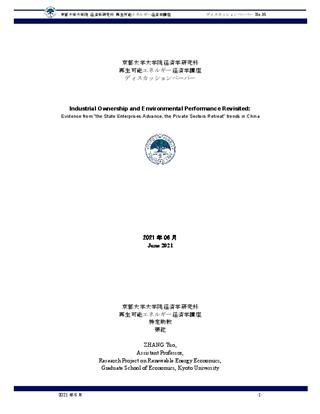TOP > ディスカッションペーパー > No.35 Industrial Ownership and Environmental Performance Revisited:Evidence from “the State Enterprises Advance, the Private Sectors Retreat” trends in China
No.35 Industrial Ownership and Environmental Performance Revisited:Evidence from “the State Enterprises Advance, the Private Sectors Retreat” trends in China
2021年6月
京都大学大学院経済学研究科
再生可能エネルギー経済学講座
特定助教 張砣
 Abstract:
Abstract:
“The State Enterprises Advance, Private Firms Retreat” trends (simply referred to as “the re-centralization trends” hereafter) in China is always criticized for threatening the efficiency of the economy. However, few studies focus on its impacts on the environment. In this study we employ a panel dataset of 159 Chinese cities from 2003 to 2009, to explore its impacts on the industrial SO2 emission patterns. The findings are as follows: (1) State ownership is positively associated with the city-level SO2 emission according to the Fix-Effect model. Nevertheless, it also has a positive impact on SO2 removal rates. The dynamic panel model confirms the results of the Fix-Effect model. (2) Moreover, the outperformance of State-Owned Enterprises (SOEs) in desulfurization cannot be explained by the size effect and the profitability effect. (3) A further comparison between the effectiveness of the re-centralization trends and the desulfurization subsidy policy shows that the market-based subsidy policy has much larger impacts than re-centralization trends. More interestingly, compared with their private counterparts, SOEs respond significantly less to the subsidy policy. To sum up, our results suggest that desulfurization is to some extent a political mission for the SOEs, which is beyond the profit-seeking considerations, and may threaten the efficiency of mitigation activities.
Keywords:State Ownership, Environmental Performance, the State Enterprises Advance, the Private Sectors Retreat trend

